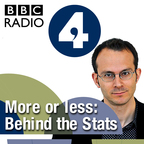
More or Less: Behind the Stats
Summary: Tim Harford investigates numbers in the news. Numbers are used in every area of public debate. But are they always reliable? Tim and the More or Less team try to make sense of the statistics which surround us. A half-hour programme broadcast at 1600 on Friday afternoons and repeated at 2000 on Sundays on Radio 4. BBC World Service broadcasts a short edition over the weekend.
- Visit Website
- RSS
- Artist: BBC Radio 4
- Copyright: (C) BBC 2015
Podcasts:
Executive pay, chess and trouble on the Greek railway.
Are we witnessing a grand economic experiment being played out between Europe, trying to cut its way out of trouble, and the United States, trying to spend its way to redemption? Plus, we investigate the height of North Koreans. This programme was first broadcast on the BBC World Service.
Are we witnessing a grand economic experiment playing out between Britain and the United States? How long have travellers been waiting to get through immigration at Heathrow? Plus, are you going to destroy the economy this bank holiday weekend?
The Midas Formula - In this week's More or Less: The story of Black-Scholes, the equation that transformed Wall Street – and the arguments over whether it made the world a better place, or helped cause the financial mess we have all been dealing with for the past five years. This programme was first broadcast on the BBC World Service.
Rain and drought in numbers, the formula which changed Wall Street and then the world forever - and why Conservative MPs used to be taller than their Labour counterparts.
Is the rate of species extinction exaggerated - or even unknowable? Producer: Richard Knight This programme was first broadcast on the BBC World Service.
We investigate the height of North Koreans, the width of police officers and rate of species extinction. Producer: Richard Knight
Are there really more Porsche Cayenne owners in Greece than taxpayers earning over 50,000 euros? Can there really be 30,000 chauffeur driven cars for the exclusive use of Italian politicians? Would it really be cheaper to send everyone by taxi than train in Greece and is youth unemployment in Spain really 50%? Ruth Alexander and Wesley Stephenson take a very close look at some widely reported Eurostats to see whether they stand up to scrutiny for out this week's More or Less. This programme was first broadcast on the BBC World Service.
The Royal Mail says UK stamp prices are still among the best value in Europe, despite an imminent steep price rise. Tim Harford finds out whether this is true, and compares the price of postal services around the world. Plus, he finds out how, after being invented by Indian mathematicians, modern numbers became established in the ancient Arab world and then journeyed on to Europe in what was essentially the first maths textbook ever written, "Liber Abaci". Its author was Leonardo of Pisa, better known as Fibonacci. Tim speaks to Keith Devlin, author of The Man of Numbers, to find out more. This programme was first broadcast on the BBC World Service.
Do Manchester United and other leading clubs like Real Madrid and Barcelona benefit from biased refereeing decisions when they play in front of their home crowd? It’s a widely-held view, but Tim Harford challenges it with a look at the penalty statistics. Plus, he meets Hans Rosling of Gapminder at the Skoll World Forum: if you want to understand the world you’re living in, and how it will be different to the world your children and grandchildren will live in, listen to this interview. This programme was first broadcast on the BBC World Service.
If there were perfect income equality worldwide, and everybody earned the same amount of money, how much would they earn? And what is the average employee wage across the world? Tim Harford answers both these questions. Plus, he attempts to rank the world’s top military forces. This edition of the programme was first broadcast on the BBC World Service.
Eating an extra portion of red meat every day is associated with an increased risk of death, says a new study. But what does this mean? A risk expert works it out for Tim Harford. Plus, which are the world’s largest employers? This edition of More or less was broadcast on the BBC World Service.
Tim Harford explains why the technology giant Apple is not bigger than Poland, as media reports have claimed. And he scrutinises the claim that the Millennium Development Goal on safe drinking water has been achieved ahead of schedule. The World Health Organisation, which along with Unicef announced that the target had been met, concedes that the numbers are not actually that certain. This programme was originally broadcast on the BBC World Service.
Tim Harford assesses how global poverty is measured, as the World Bank releases the latest figures on the number of people living on less than a dollar a day. What progress has been made, and how useful a benchmark is this “dollar a day” global poverty line? This programme was originally broadcast on the BBC World Service.
Fifty-five per cent of Syrians do not think their leader President Assad should resign, according to media reports of an opinion poll. It’s a striking number, given the bloody violence that has broken out in Syria. But Tim Harford discovers that, on closer inspection, the statistic is not what it seems. Plus, which European country works the longest hours? You might be surprised. This programme was first broadcast on the BBC World service.